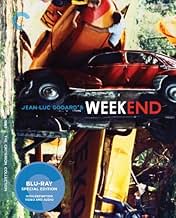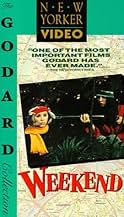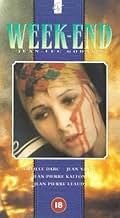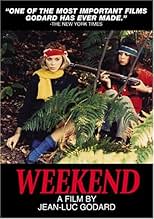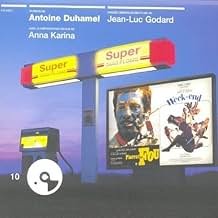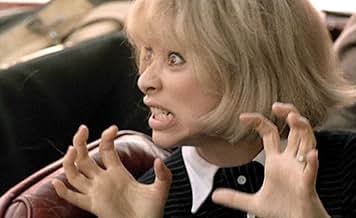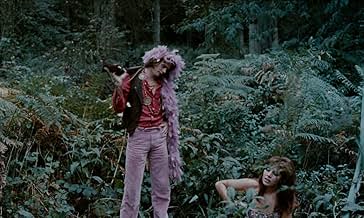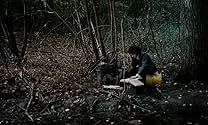VALUTAZIONE IMDb
6,9/10
16.383
LA TUA VALUTAZIONE
La storia surreale di una coppia sposata che affronta un viaggio per andare a trovare i genitori della moglie con l'intenzione di ucciderli per l'eredità.La storia surreale di una coppia sposata che affronta un viaggio per andare a trovare i genitori della moglie con l'intenzione di ucciderli per l'eredità.La storia surreale di una coppia sposata che affronta un viaggio per andare a trovare i genitori della moglie con l'intenzione di ucciderli per l'eredità.
- Regia
- Sceneggiatura
- Star
- Premi
- 1 vittoria e 4 candidature totali
Yves Afonso
- Gros Poucet
- (non citato nei titoli originali)
Yves Beneyton
- Un membre du FLSO
- (non citato nei titoli originali)
Juliet Berto
- Une activiste du FLSO
- (non citato nei titoli originali)
- …
Michèle Breton
- Girl in the woods
- (non citato nei titoli originali)
Michel Cournot
- Man From Farmyard
- (non citato nei titoli originali)
Lex De Bruijn
- Revolutionary
- (non citato nei titoli originali)
Jean Eustache
- L'auto-stoppeur
- (non citato nei titoli originali)
Jean-Claude Guilbert
- Le clochard
- (non citato nei titoli originali)
Paul Gégauff
- Le pianiste
- (non citato nei titoli originali)
Blandine Jeanson
- Emily Bronte
- (non citato nei titoli originali)
Louis Jojot
- Monsieur Jojot
- (non citato nei titoli originali)
Valérie Lagrange
- La femme du chef du FLSO
- (non citato nei titoli originali)
Jean-Pierre Léaud
- Saint-Just
- (non citato nei titoli originali)
- …
Ernest Menzer
- Ernest - le cuisinier
- (non citato nei titoli originali)
- …
Sanvi Panou
- Mon frère africain
- (non citato nei titoli originali)
Recensioni in evidenza
10miloc
I gave this movie a 10 out of 10. I expect many people would feel hard-pressed to give it a 2 on the same scale, and I honestly wouldn't blame those who do. "Week End" is a machine built to provoke, and perhaps irritation as well as admiration can be a measure of such a machine's success.
For myself, I love it. It boils with anger, frustration, and insane energy. In one sense, it approaches film like the Cubists approached painting, breaking down images, ideas, characters and plot into startlingly photographed, almost geometric segments. But where the Cubists were to content to experiment with form Godard's instincts stay furiously political; it's as though an early Picasso had been commandeered and refitted by George Grosz.
Arrogance is not always a drawback, as rock and roll fans know-- and "Week End" is a terribly arrogant film. The director trashes every convention that he can think of. It's all thrown together-- music, dialogue, on-screen text, unvarnished political theory, frightening violence-- onto a bare hook of a plot: a young, apparently soulless couple go on a week-end trip in the middle of what appears to be the end of Western civilization. Without apologies Godard throws this mess on the table and asks the rest of us, "What have you got to match it?"
Sadly, not much. Cinema as an art has regressed rather than advanced since this film was released. (Godard himself stalled after "Week End.") Despite the rise of independently funded, non-Hollywood films in the past decade, no one seems ready to dare the sort of experimentation with what film could be that was begun in the 60s, and this is a sad thing. The films made by Godard at the height of his powers are all the more precious now. "Week End" is a document of a time when film mattered. It is an artifact, but it would only be dated if it had been surpassed. It does not rest in peace.
For myself, I love it. It boils with anger, frustration, and insane energy. In one sense, it approaches film like the Cubists approached painting, breaking down images, ideas, characters and plot into startlingly photographed, almost geometric segments. But where the Cubists were to content to experiment with form Godard's instincts stay furiously political; it's as though an early Picasso had been commandeered and refitted by George Grosz.
Arrogance is not always a drawback, as rock and roll fans know-- and "Week End" is a terribly arrogant film. The director trashes every convention that he can think of. It's all thrown together-- music, dialogue, on-screen text, unvarnished political theory, frightening violence-- onto a bare hook of a plot: a young, apparently soulless couple go on a week-end trip in the middle of what appears to be the end of Western civilization. Without apologies Godard throws this mess on the table and asks the rest of us, "What have you got to match it?"
Sadly, not much. Cinema as an art has regressed rather than advanced since this film was released. (Godard himself stalled after "Week End.") Despite the rise of independently funded, non-Hollywood films in the past decade, no one seems ready to dare the sort of experimentation with what film could be that was begun in the 60s, and this is a sad thing. The films made by Godard at the height of his powers are all the more precious now. "Week End" is a document of a time when film mattered. It is an artifact, but it would only be dated if it had been surpassed. It does not rest in peace.
Yeah, it's super bizarre and it's probably Godard's strangest work (which is saying a lot) that I've seen, but I still couldn't look past the glaring flaws and just love the wonderfully surrealist images. The first hour or so of the film is pretty much perfect, combining a brutally random sense of violence with some delightfully weird fantasy images and a dark, dark sense of humour. The infamous ten minute long tracking shot of the traffic jam manages to remain entertaining throughout by linking a series of hilariously comic moments. I also especially liked the bit with the guy with the Porsche singing into a pay phone and the inexplicable appearance of Emily Brontë, who is dismissed as a fictional character and lit on fire. However, once Godard's political beliefs begin making their presence felt in an all too explicit and blatant manner, the film grinds to a halt. I was simply bored during the long monologues on America's foreign policy, which seemed a rather childish attempt by Godard to get his message across. The film never really recovers from this, as even the appearance of a group of cannibalistic revolutionaries can't bring back the same sense of black comedy that populated the first 2/3 of the film. Still, it's utterly brilliant for a majority of the time, and its bizarre images mask a mostly subtle and intelligent tirade against society and commercialism. Not for the faint-hearted, though.
There are enough interesting devices employed in Week-end to make one regret its fatal flaws. The ten minute long tracking shot of the traffic jam near the film's beginning, which has elicited so much press, is indeed riveting. There are other moments of brilliance, such as the long circular pan at the piano recital. But the problems with Week-end eventually overpower these moments and one is left wondering why the film and its creator have such a reputation for greatness. Ultimately, Godard's quite valid points about the complacency of the bourgeoisie, the brutality of human nature and the false promises of philosophy, religion and art are undermined by his heavy-handedness. Did Godard really believe that it was necessary to give us scene after scene of people acting in the same craven way to make us understand? Did we really need the 15 minute-long revolutionary speech by the garbage collectors to be able to see his point? Even the implied cannibalism in the final scene is rendered impotent, as just a few minutes earlier, we are forced to watch the very real (and sickening) killing and butchery of a pig. This film, edited mercilessly, would have made a fascinating 45-minute short, and would've produced much more impact upon the viewer. Instead, we are left with this rambling, repetitious exercise in excess. If you intend to see Week-end, I recommend keeping a finger poised over your fast-forward button.
Jean-Luc Godard will always be Jean-Luc Godard. Either you love his films or hate them. Either you love the guy or hate him. Now, with "Weekend" (1967, France), I just don't know what to make of him (not that this is not what I generally feel whenever I see one of his films).
At the film's opening credits, it's outrightly declared that it's "a film adrift in cosmos". Godard must've meant that seriously, for once you've entered the film's universe, you're in for one wreck of a viewing experience. This is one chaotic universe--and I meant to say it in a pleasurable way!
To attempt to state the plot of the film could only be a disservice to it--though this is not to say that the film doesn't have a "plot"! To attempt to extract the essence of the film might only be a disgrace to it--though this is not to say that the film doesn't have an "essence"! To attempt to map out Godard's agenda in making the film could just turn out to be a mockery of the filmmaker--though this is not to say that the film doesn't have an "agenda"!
The plot? A couple goes on a weekend trip to their parents' house to execute a sinister plan....The essence? The decadence of bourgeois values, the arbitrary yet natural progression of fate, and the transformative power of social awakening....The agenda? For Godard to become increasingly political and to continue on deconstructing the traditional film narrative methods, and thus "alienating" the film audience.... (Much like, theater-wise, Bertolt Brecht had increasingly become political in his succeeding plays while at the same time had continued on employing "alienating" theatrical devices.)
But all of these takes a side-step to give way to the overwhelming chaos, arbitrariness and "playful" senselessness that truly characterize "Weekend". Or, perhaps, the "means" are designed to be of service to the "end".
This chaotic cosmos is potently embedded in the viewers' sensibilities by way of that jaw-droppingly sustained 10-minute dolly shot of a horrendous countryside traffic jam (the "mother of all traffic jams", as one film reviewer ably put it) that the above-quoted couple encountered on their way to Oinville (their parents' place). After that, the quirky and amoral couple would continue to meet along the way a whole lot of "hindrances" to their destination, most of which Godard leisurely takes his time to stage (as what he did, say, in "Alphaville" and "Band of Outsiders").
On the one hand, these "hindrances" appear to be a carry-over from the previous traffic jam that the couple went through (those car wrecks and corpses). On the other hand, they are intended to be an overt display of the filmmaker's alienating techniques (like at one point where the couple gets to encounter a pair of "fictional", "literary" characters and the man starts to blurt out how "trashy" the film is for all they meet are "crazy characters"--how hilarious!). On the other still, they serve as a venue for Godard's explicit political views, the expressiveness is of such a way that this may take the form of direct camera address (like in that long scene where these two "brothers" pour out their thoughts and sentiments about the oppression in South Africa and the discrimination of the blacks).
Now that I have mentioned things political, I'm not sure if it's even necessary to mention the political "awakening" that came upon the woman after the couple was kidnapped by a band of Communist guerrillas. The scenes comprising this specific episode tread the line of being absurd, grotesque and outrageous that seeing them can't even make one believe them.
The online Premiere magazine listed "Weekend" as one of the "25 Most Dangerous Movies". "Dangerous" in the sense of these films challenge our "bedrock notions" of what it is that we normally see in the movies and how we see them (with films like "A Clockwork Orange", "Eraserhead", "Requiem for a Dream", "Freaks"). It's a question of theme and method. Well, it's not that JLG's films have not always turned our viewing experience upside down. But when compared to, let's say, the ebullient fatalism of "Breathless", "Weekend" in fact exudes an apocalyptic melange and an irresolvable recklessness that make it rather an uncomfy fare.
The irony is that even if this Godard film is labeled as "dangerous", it's still worth a repeat viewing, much like all the other films that made it to the Premiere mag's list. It's one thing to say that this film poses danger and it's another to say that this film is "painful to watch twice". It's something that's worthy of another article--and actually there's an available list for that already!
At the film's opening credits, it's outrightly declared that it's "a film adrift in cosmos". Godard must've meant that seriously, for once you've entered the film's universe, you're in for one wreck of a viewing experience. This is one chaotic universe--and I meant to say it in a pleasurable way!
To attempt to state the plot of the film could only be a disservice to it--though this is not to say that the film doesn't have a "plot"! To attempt to extract the essence of the film might only be a disgrace to it--though this is not to say that the film doesn't have an "essence"! To attempt to map out Godard's agenda in making the film could just turn out to be a mockery of the filmmaker--though this is not to say that the film doesn't have an "agenda"!
The plot? A couple goes on a weekend trip to their parents' house to execute a sinister plan....The essence? The decadence of bourgeois values, the arbitrary yet natural progression of fate, and the transformative power of social awakening....The agenda? For Godard to become increasingly political and to continue on deconstructing the traditional film narrative methods, and thus "alienating" the film audience.... (Much like, theater-wise, Bertolt Brecht had increasingly become political in his succeeding plays while at the same time had continued on employing "alienating" theatrical devices.)
But all of these takes a side-step to give way to the overwhelming chaos, arbitrariness and "playful" senselessness that truly characterize "Weekend". Or, perhaps, the "means" are designed to be of service to the "end".
This chaotic cosmos is potently embedded in the viewers' sensibilities by way of that jaw-droppingly sustained 10-minute dolly shot of a horrendous countryside traffic jam (the "mother of all traffic jams", as one film reviewer ably put it) that the above-quoted couple encountered on their way to Oinville (their parents' place). After that, the quirky and amoral couple would continue to meet along the way a whole lot of "hindrances" to their destination, most of which Godard leisurely takes his time to stage (as what he did, say, in "Alphaville" and "Band of Outsiders").
On the one hand, these "hindrances" appear to be a carry-over from the previous traffic jam that the couple went through (those car wrecks and corpses). On the other hand, they are intended to be an overt display of the filmmaker's alienating techniques (like at one point where the couple gets to encounter a pair of "fictional", "literary" characters and the man starts to blurt out how "trashy" the film is for all they meet are "crazy characters"--how hilarious!). On the other still, they serve as a venue for Godard's explicit political views, the expressiveness is of such a way that this may take the form of direct camera address (like in that long scene where these two "brothers" pour out their thoughts and sentiments about the oppression in South Africa and the discrimination of the blacks).
Now that I have mentioned things political, I'm not sure if it's even necessary to mention the political "awakening" that came upon the woman after the couple was kidnapped by a band of Communist guerrillas. The scenes comprising this specific episode tread the line of being absurd, grotesque and outrageous that seeing them can't even make one believe them.
The online Premiere magazine listed "Weekend" as one of the "25 Most Dangerous Movies". "Dangerous" in the sense of these films challenge our "bedrock notions" of what it is that we normally see in the movies and how we see them (with films like "A Clockwork Orange", "Eraserhead", "Requiem for a Dream", "Freaks"). It's a question of theme and method. Well, it's not that JLG's films have not always turned our viewing experience upside down. But when compared to, let's say, the ebullient fatalism of "Breathless", "Weekend" in fact exudes an apocalyptic melange and an irresolvable recklessness that make it rather an uncomfy fare.
The irony is that even if this Godard film is labeled as "dangerous", it's still worth a repeat viewing, much like all the other films that made it to the Premiere mag's list. It's one thing to say that this film poses danger and it's another to say that this film is "painful to watch twice". It's something that's worthy of another article--and actually there's an available list for that already!
This was the culmination of almost seven years of work for Godard; arriving at a point in which his command of the film-making process was at its most confident and his talent as both a satirist and a grand provocateur could be channelled into making his ultimate statement - about society, cinema and the future of both - in such a way as to act as the bridge between the work that came before, and the work that would eventually follow. With Week End (1967), the intention was to confront the audience with the ultimate depiction of bourgeois decadence in all its morally-bankrupt banality; extending on the ideas behind his previous film, the complicated 2 or 3 Things I Know About Her (1967) - in which prostitution was used as a metaphor for a vapid consumer society willing to confine itself to ineffective action, whilst simultaneously selling itself out for the comfort of life's little luxuries - and all the while creating a merciless parody of the decline of western civilisation in a way that seems frighteningly close to the world that we live in today.
Throughout the film, Godard maintains a tone that is both serious and sardonic; showing us the morally-bankrupt nature of these characters and the mechanisms of the society in which they exist, while simultaneously creating an almost apocalyptic depiction of the end of society brought down by selfishness, consumerism, cannibalism and more. Alongside these particular themes, Godard layers in rudiments of social satire, contemporary French politics, the air of revolution - as hinted towards in the preceding send-up of La Chinoise (1967) - and a less than subtle reliance on Marxist ideologies to tie the whole thing together. Combine these elements with the director's continually provocative approach to film-making - including his typically unconventional use of music, inter-titles, crash cuts, tracking shots, pop-art inspired iconography and jarringly beautiful primary colours, all tied together by the always polarising appropriation of Brecht - and you have a film that is nothing less than progressive, defiant and utterly unique. All of these devises are used to disorientate the audience in a way that makes the viewing of the film as uncomfortable as possible; as scenes drag on and on while the camera explores the often absurd and abstracted tableau of scenes and scenarios in a way that seems to assault the senses of those of us more familiar with the conventional (i.e. bland) films still being produced by Hollywood to this very day.
With this in mind, many approach Week End as anti-narrative film; somehow implying that the film lacks the required elements of plot or character. However, this simply isn't the case. Although it as a far removed from conventional cinema as you could possibly get, there is still a definite narrative to be followed here; with central characters, themes and the traditional idea of characters moving towards a certain set goal as the film progresses. However, there's no attempt to pander to the notions of genre or convention; with Godard instead using satire, allegory, metaphor, pastiche and deconstruction to create several separate avenues of interpretation that all lead back to the central comment on the nature of society in the year nineteen sixty seven. At the time of its release, Week End was seen as a stark comment on the way society was heading, and without question Godard was spot on in his depiction of a world sold out and cast adrift, consumed by consumption its very self and eventually reaching the point at which all forms of expression break down, and are replaced by barbaric savagery, cynicism and self-delusion.
You could argue that most viewers dislike the film simply because it challenges them to think carefully about their own actions and the way they live their lives; with Godard all the while offering his amusing, provocative and highly satirical condemnation of a vapid society, personified by the parasitic creation of Roland and Corrine, a couple so truly fuelled by consumption and greed that the plot itself practically hinges on the question of whether or not they would resort to killing an elderly relative simply for financial gain. Although heavily stylised and overblown for purposes of surrealist humour, Roland and Corrine offer a mirror image of contemporary society at its very worst; predicting a number of currently relevant notions such as the loss of tradition, honour, family and respect, as well as the ultimate destruction, disregard and dismissal of concepts such as art, culture and history. Look around you and you'll see the social relevance of Week End, not simply as a satirical piece, but as a work of pure, abstract prophesy. Society may not have descended to the level of cannibal revolutionaries in the literal sense; but in the regurgitation of violence, horror, sensationalism, scandal, greed and consumption we feed off the carcass of the twentieth century and continue to ask for more.
These themes are expressed in the form of an episodic road movie, continually stylised and colour coded in reference to the traditions of the French flag - with its noble references to liberty, equality and fraternity turned into purposely banal expressions of on-screen agitprop - with even the most profane elements of the plot captured with all the pastoral, idyllic warmth of a traditional picture postcard. The themes and ideas behind the film run so much deeper than this review could ever suggest, with Godard creating one of the most interesting, exciting and entirely radical films of this period. It is difficult and it does take work; however, the sheer weight of Godard's ideas, the intelligence of his vision and the relevance of his themes make it a more than worthwhile experience. Give it time, and you might realise that much of the film is satire at its most wicked. It's also a great deal of fun, and has a number of fantastic scenes that just get better and better with each consecutive viewing.
Throughout the film, Godard maintains a tone that is both serious and sardonic; showing us the morally-bankrupt nature of these characters and the mechanisms of the society in which they exist, while simultaneously creating an almost apocalyptic depiction of the end of society brought down by selfishness, consumerism, cannibalism and more. Alongside these particular themes, Godard layers in rudiments of social satire, contemporary French politics, the air of revolution - as hinted towards in the preceding send-up of La Chinoise (1967) - and a less than subtle reliance on Marxist ideologies to tie the whole thing together. Combine these elements with the director's continually provocative approach to film-making - including his typically unconventional use of music, inter-titles, crash cuts, tracking shots, pop-art inspired iconography and jarringly beautiful primary colours, all tied together by the always polarising appropriation of Brecht - and you have a film that is nothing less than progressive, defiant and utterly unique. All of these devises are used to disorientate the audience in a way that makes the viewing of the film as uncomfortable as possible; as scenes drag on and on while the camera explores the often absurd and abstracted tableau of scenes and scenarios in a way that seems to assault the senses of those of us more familiar with the conventional (i.e. bland) films still being produced by Hollywood to this very day.
With this in mind, many approach Week End as anti-narrative film; somehow implying that the film lacks the required elements of plot or character. However, this simply isn't the case. Although it as a far removed from conventional cinema as you could possibly get, there is still a definite narrative to be followed here; with central characters, themes and the traditional idea of characters moving towards a certain set goal as the film progresses. However, there's no attempt to pander to the notions of genre or convention; with Godard instead using satire, allegory, metaphor, pastiche and deconstruction to create several separate avenues of interpretation that all lead back to the central comment on the nature of society in the year nineteen sixty seven. At the time of its release, Week End was seen as a stark comment on the way society was heading, and without question Godard was spot on in his depiction of a world sold out and cast adrift, consumed by consumption its very self and eventually reaching the point at which all forms of expression break down, and are replaced by barbaric savagery, cynicism and self-delusion.
You could argue that most viewers dislike the film simply because it challenges them to think carefully about their own actions and the way they live their lives; with Godard all the while offering his amusing, provocative and highly satirical condemnation of a vapid society, personified by the parasitic creation of Roland and Corrine, a couple so truly fuelled by consumption and greed that the plot itself practically hinges on the question of whether or not they would resort to killing an elderly relative simply for financial gain. Although heavily stylised and overblown for purposes of surrealist humour, Roland and Corrine offer a mirror image of contemporary society at its very worst; predicting a number of currently relevant notions such as the loss of tradition, honour, family and respect, as well as the ultimate destruction, disregard and dismissal of concepts such as art, culture and history. Look around you and you'll see the social relevance of Week End, not simply as a satirical piece, but as a work of pure, abstract prophesy. Society may not have descended to the level of cannibal revolutionaries in the literal sense; but in the regurgitation of violence, horror, sensationalism, scandal, greed and consumption we feed off the carcass of the twentieth century and continue to ask for more.
These themes are expressed in the form of an episodic road movie, continually stylised and colour coded in reference to the traditions of the French flag - with its noble references to liberty, equality and fraternity turned into purposely banal expressions of on-screen agitprop - with even the most profane elements of the plot captured with all the pastoral, idyllic warmth of a traditional picture postcard. The themes and ideas behind the film run so much deeper than this review could ever suggest, with Godard creating one of the most interesting, exciting and entirely radical films of this period. It is difficult and it does take work; however, the sheer weight of Godard's ideas, the intelligence of his vision and the relevance of his themes make it a more than worthwhile experience. Give it time, and you might realise that much of the film is satire at its most wicked. It's also a great deal of fun, and has a number of fantastic scenes that just get better and better with each consecutive viewing.
Lo sapevi?
- QuizThe tracking shot of the traffic jam was the longest tracking shot in the history of cinema at that point in time as it was 300 meters long.
- Versioni alternativeFor the original U.S. theatrical release, distributor Grove Press dubbed the monologues (the garbagemen's piece on black revolution and the hippie's "ocean" poem) into English, although the rest of the film was in the original French with subtitles. A short credits sequence was also appended to the end of the film.
- ConnessioniEdited into Bande-annonce de 'Week End' (1967)
I più visti
Accedi per valutare e creare un elenco di titoli salvati per ottenere consigli personalizzati
- How long is Weekend?Powered by Alexa
Dettagli
Botteghino
- Budget
- 250.000 USD (previsto)
- Tempo di esecuzione1 ora 45 minuti
- Mix di suoni
- Proporzioni
- 1.66 : 1
Contribuisci a questa pagina
Suggerisci una modifica o aggiungi i contenuti mancanti

Divario superiore
By what name was Week End - Una donna e un uomo da sabato a domenica (1967) officially released in India in English?
Rispondi
